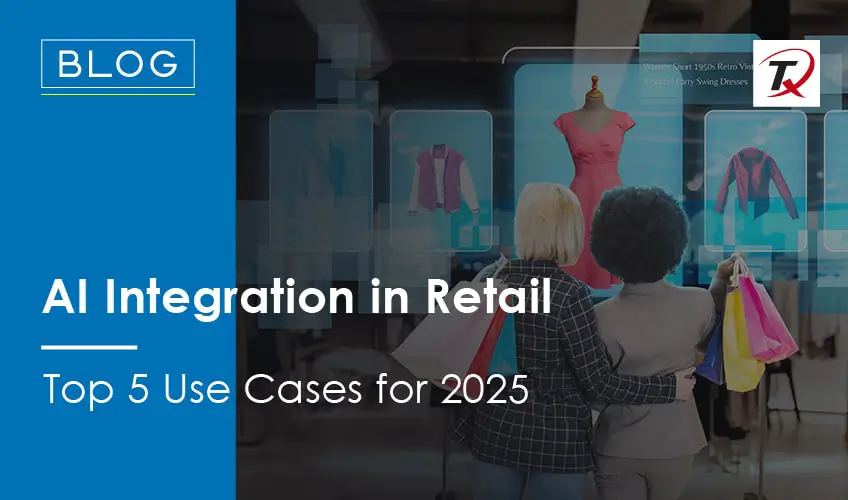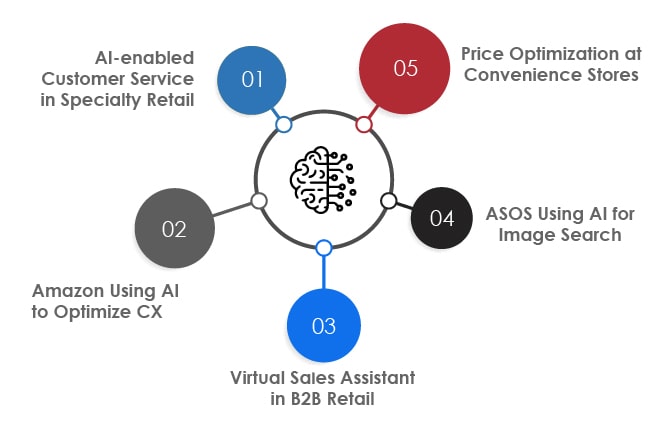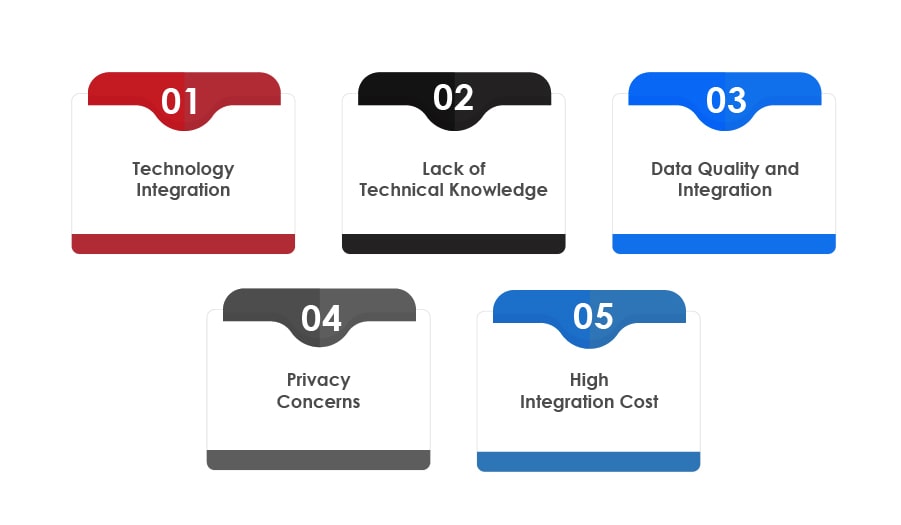Recommended Blogs
AI Integration in Retail: Top 5 Use Cases

Imagine an industry heavily dependent on traditional business methods is now making profits of $400 billion to $660 billion annually. This is true in the retail sector as it is undergoing a significant transformation due to AI integration. According to a survey, nearly 50% of retail business owners self-reported using AI tech innovations. This is not surprising, given the positive revenue that AI integration in retail can generate. But which tech innovations are making retailers shift towards AI, and how can they boost sales, improve CX, and stay competitive? Let us understand and explore the AI use cases in detail.
What is the Role of AI Integration in Retail?
AI integration in retail is about automating operations, improving customer service, gaining data-driven insights for decision-making, and enhancing shopping experience. Around 87% of retailers already use AI technology in at least one business area. Its role extends from supply chain management to checkout, offering substantial benefits to retailers and users. Here’s how AI is making a significant impact in the retail industry:
• It can analyze vast data sets to predict product demand, including market trends and past purchases. This allows retailers to optimize inventory levels, avoid overstocking and outages, and ensure the availability of popular items.
• ML models offer personalized recommendations, marketing messages, and promotions by analyzing data such as browsing and purchasing habits. This, in turn, enhances CX and boosts sales by making shopping more engaging and relevant.
• AI-based chatbots and virtual assistants handle user queries and issues 24/7. It improves the overall service experience and allows human staff to focus on complex tasks.
• AI systems facilitate price recommendation by analyzing market conditions, customer demand, and competitor pricing. It enables retailers to adjust prices, maximize profitability, and stay competitive.
• AI tools analyze customer behavior and transaction patterns to detect fraud or theft. Thus, retailers can prevent significant losses and secure their investments.
5 AI Use Cases in Retail for 2025

AI technology brings a wide range of functionalities and opportunities that go beyond improving CX and lead generation. It helps in streamlining processes, allowing businesses to maintain a competitive edge. Following are some of the use cases of AI integration in the retail industry:
AI-enabled Customer Service in Specialty Retail:
Specialty retailers are using AI-enabled chatbots in their call centers to handle common customer questions and inquiries. By implementing Gen-AI, they facilitate more complex and emotion-driven conversations to optimize customer experience. For example, IKEA’s AI bot ‘Billie’ achieved a success rate of 47% for handling customer queries, allowing the company to train and engage their workforce in more productive tasks, such as product designing, face-to-face customer interactions, etc. AI can easily elevate the front and back-end processes in beauty & makeup, jewelry fittings, and home design consultations. Retailers like Benefit Cosmetics, Sephora, and Ulta use AI-enabled visual tools to provide personalized shopping experiences and optimize customer service.
Amazon Using AI to Optimize CX:
One of the biggest examples of AI use cases is Amazon. They are using Gen-AI to create personalized recommendations. It customizes its homepage for every user using AI-enabled analytics and data collection tools to remain competitive as an omnichannel retailer. It analyzes data about customer’s purchasing behavior, wishlist, items, and preferences in their cart. Amazon AI-enabled analytics scans past and real-time data to gain valuable insights into user preferences. In doing so, they create personalized marketing campaigns to elevate overall CX and service levels. Such practices drive 35% of their purchases. Using AI and augmented reality technologies, Amazon has enabled virtual try-ons to allow customers to visualize how makeup products, furniture items, accessories, and clothes will look on them or in their space.
Virtual Sales Assistant in B2B Retail:
One of the major concerns for B2B retailers is meeting customer expectations that change frequently. Due to the lack of intelligent, connected sales support tools, they often face various difficulties. With Gen-AI, B2B retail employees can access internal sales data quickly and resolve customer queries efficiently. For instance, a coworker AI bot can help resolve sales-related queries and provide quick guidance to salespersons. It is a virtual sales assistant that enables B2B companies to deal with complex transactions and industry-specific hurdles. B2B retailers can also improve their sales interactions and increase customer satisfaction.
ASOS Using AI for Image Search:
ASOS uses visual search technology to facilitate the Style Match feature on its app. Users can take an item photo or upload an image from their library to begin the image search process. The ML algorithms then analyze visual information like patterns, colors, and size to find the matching product and provide personalized recommendations. There’s also a voice search option to allow customers to browse and purchase products without using their fingers on the screen. Users can use voice commands via Amazon Alexa, Samsung Bixby, Google Assistant, Apple Siri, etc. Retailers also develop their voice-enabled shopping assistants to amplify the CX.
Price Optimization at Convenience Stores:
AI applications like dynamic pricing algorithms significantly impact retailers’ margins. Customers are susceptible to pricing, and convenience stores must systematically cater to their buying behavior. Implementing ML for dynamic pricing helps retailers maintain customer loyalty and trust. Retailers can utilize electronic shelf labels, digital stock information, and discount offers to attract new customers, reduce waste, and optimize pricing strategies.
For retailers to implement these use cases in their business strategy, they need to focus on establishing a robust user database. Centralizing data can facilitate a comprehensive view of customer choices across stores, regions, and partners. With a data-driven approach, retailers can make informed business decisions and practically integrate AI.
Challenges and Solutions of AI Integration in Retail

AI integration in retail presents several challenges that must be addressed to utilize its potential fully. Retailers often face obstacles related to costs, technology acceptance, data, etc. Let us look at some potential AI integration challenges and their solutions in detail:
Technology Integration:
AI integration with existing retail operations (outdated or legacy systems) can be complex and disruptive. Retailers should select AI solutions compatible with their existing IT infrastructure or try to upgrade their legacy systems to sync with AI solutions. Partnering with flexible post-implementation support vendors would also help mitigate integration issues.
Lack of Technical Knowledge:
Retailers usually lack the in-house technical expertise to implement and maintain AI systems. Partnering with technology providers offering technology and expertise to implement AI solutions can help resolve this challenge. Also, investing in training and development for existing staff will build a knowledgeable in-house team over time.
Data Quality and Integration:
One of the biggest challenges in AI integration is the need for high-quality, streamlined data. AI systems require accurate data to function effectively. However, retailers often have siloed data across different formats or departments. This creates difficulty for retailers in leveraging such data. They should invest in robust data management and testing solutions to consolidate data sources into a unified format. Partnering with a professional QA provider like Tx for data governance practices will ensure the accuracy and consistency of the data used, enhancing AI performance.
Privacy Concerns:
AI systems rely on consumer data to provide personalized experiences and optimize operations, which can raise privacy concerns. Retailers should prioritize consumer privacy by implementing strong data security measures and following data protection guidelines. A professional security auditing and testing provider can help retailers build customer trust.
High Integration Cost:
The initial AI integration cost can be significant, involving expenses for technology acquisition, training programs, and system upgrades. To manage costs, retailers should start AI integration with specific business areas that can have an immediate impact. Later, they should gradually shift to full-scale AI integration. This approach would allow them to scale their investment based on results, minimizing financial risk.
Summary
The retail industry is significantly transforming with AI integration, enhancing operations and CX. It allows retailers to automate inventory management, improve customer service through chatbots, and enable dynamic pricing strategies. Despite the transformative potential, retailers face several challenges, requiring proper measures for successful integration. Partnering with a professional QA expert like Tx would be beneficial in addressing the issues involved with AI integration and ensuring sustainability in the retail environment.
How can Tx help with AI Integration in Retail?
The retail sector is experiencing an intense transformation with AI integration and changing user behavior. It has changed how retailers perceive, develop, support, and run IT applications and technology. Tx has been assisting retailers in assuring quality across their enterprise applications by leveraging its intelligent solutions. Partnering with Tx for AI integration in retail would offer you the following perks:
• Powerful reporting and metrics, offering real-time insights to enhance testing productivity.
• Custom AI testing solutions to address integration challenges in retail like supply chain logistics, optimizing inventory levels, personalizing customer interactions, etc.
• Robust data management solutions to consolidate disparate data sources into a unified system and ensure high-quality, actionable data.
• Ensure smooth integration with minimal disruption to ongoing operations.
• Enable CI/CD pipelines using industry-standard tools and our in-house Tx-DevOps accelerator.
• Ability to harness AI for test automation using partner tools and our in-house accelerators, delivering advanced AI testing solutions tailored to your retail-specific needs.
To know more, contact our QA experts now.
Discover more
